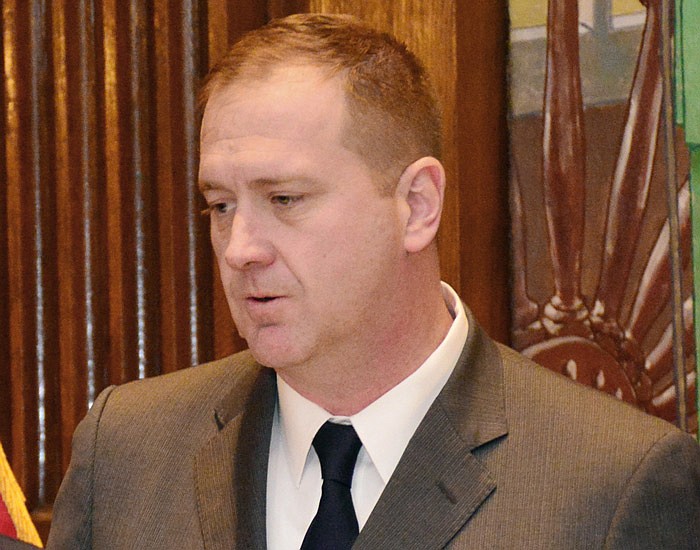After at least one hospital system in Missouri stopped providing emergency contraception because of ambiguity in the state's abortion ban, Attorney General Eric Schmitt's office clarified Wednesday that contraception is not prohibited under state law.
"Missouri law does not prohibit the use or provision of Plan B, or contraception," said Chris Nuelle, a spokesperson for Schmitt.
The Kansas City Star first reported late Tuesday night that Saint Luke's Health System in Kansas City was no longer providing emergency contraception, citing the "ambiguous" nature of Missouri's trigger ban. Following Schmitt's comments Wednesday, the health system released a statement saying it would resume providing them to its patients.
"However, the ambiguity of the law and the uncertainty even among state officials about what this law prohibits continues to cause grave concern and will require careful monitoring," the statement said. "This is especially true because the penalty for violation of the statue includes the criminal prosecution of health care providers whose sole focus is to provide medically necessary care for their patients."
Meanwhile, University Health, Kansas City's safety net hospital and the teaching hospital associated with the University of Missouri-Kansas City, continued offering IUDs and emergency contraceptives, like the Plan B pill, the system's spokeswoman, Leslie Carto, said in a statement before Schmitt's office's announcement.
Nearly all abortions are now illegal in Missouri after Schmitt issued an opinion kicking off a trigger ban on the procedure lawmakers passed in 2019. There are no exceptions for rape or incest under the law, and abortions are only permitted in the case of a medical emergency, such as to save the patient's life.
Health care providers who violate the state's ban on abortions can be guilty of a class B felony, which can result in five to 15 years in prison, and have their medical license suspended or revoked.
Since a leaked draft of the U.S. Supreme Court's decision was made public, questions have swirled about what the overturn of Roe v. Wade could mean for access to contraceptives. Emergency contraception is used to prevent pregnancy after intercourse and is often offered to victims of sexual assault.
House Minority Leader Crystal Quade, D-Springfield, requested Wednesday that Schmitt issue an official opinion on whether patients can be prosecuted for using contraception under Missouri's trigger law.
"In the absence of state guidance, however, there is a real danger a politically ambitious or ideologically motivated prosecutor could file malicious criminal charges over contraception use," Quade said in a statement Wednesday.
In her request, Quade also asked Schmitt whether his office intends to independently prosecute allegations of illegal abortions, pursue charges against providers that prescribe "any such medicines or devices for the purposes of preventing a pregnancy" and whether a pregnant person will be exempt from being charged for inducing an illegal abortion.
The Planned Parenthood clinic in St. Louis, which up until Friday had been the state's last remaining abortion provider, has repeatedly stressed that birth control is still permitted in Missouri.
"If you are a patient in need of contraception, STI testing and treatment, if you are a trans individual, our doors are open and we will continue to make sure that Planned Parenthood is a welcoming place for all people," Yamelsie Rodríguez, president and CEO of Reproductive Health Services of Planned Parenthood of the St. Louis Region, said during a news conference Friday.
Planned Parenthood Great Plains will continue to offer emergency contraceptives in its health centers in Missouri and Kansas, Anamarie Rebori Simmons, a spokeswoman for the provider said.
"We believe an announcement like the one made by a major area health system, risks leading other providers to restrict access to Plan B and other emergency contraceptives," she added.
On Tuesday, Gov. Mike Parson told reporters the state health department was evaluating whether the newly-enacted trigger ban applies to contraceptives, according to St. Louis Public Radio.
"The Department of Health will make those clarifications for us," Parson told St. Louis Public Radio. "I think they're in the process of making that clarification so everybody knows how we're going to read that."
A spokesperson for the Missouri Department of Health and Senior Services did not immediately respond to a request for comment.
Last year, state lawmakers unsuccessfully attempted to bar certain forms of contraceptives from being paid for through the state's Medicaid program and have signaled another push may be up for discussion in a post-Roe world.
The Missouri Independent, www.missouriindependent.com, is a nonprofit, nonpartisan news organization covering state government and its impact on Missourians.

